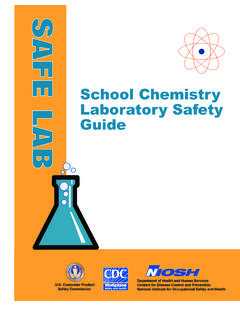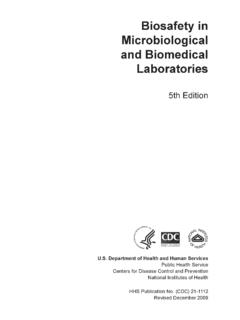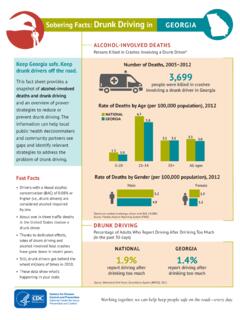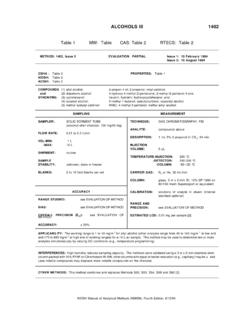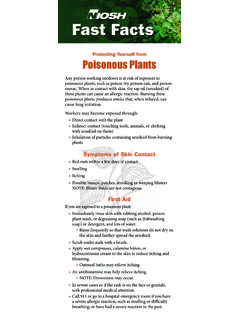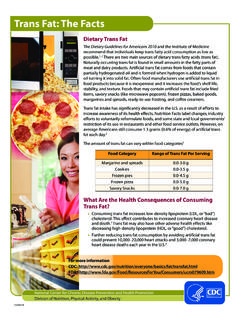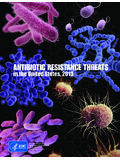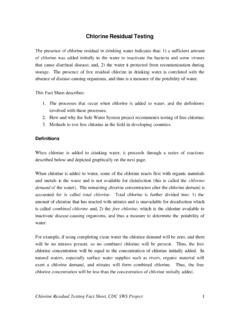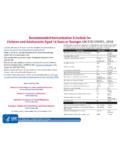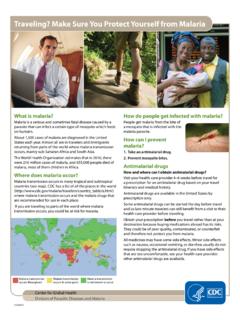Transcription of Long-Term Care (LTC) Respiratory Surveillance Line List
1 Long-Term care (LTC) Respiratory Surveillance line List Instructions for the Long-Term care (LTC) Respiratory Surveillance line List The Respiratory Surveillance line List provides a template for data collection and active monitoring of both residents and staff during a suspected Respiratory illness cluster or outbreak at a nursing home or other LTC facility. Using this tool will provide facilities with a line listing of all individuals monitored for or meeting the case definition for the outbreak illness. Each row represents an individual resident or staff member who may have been affected by the outbreak illness ( , case).
2 The information in the columns of the worksheet capture data on the case demographics, location in the facility, clinical signs/symptoms, diagnostic testing results and outcomes. While this template was developed to help with data collection for common Respiratory illness outbreaks the data fields can be modified to reflect the needs of the individual facility during other outbreaks. Information gathered on the worksheet should be used to build a case definition, determine the duration of outbreak illness, support monitoring for and rapid identification of new cases, and assist with implementation of infection control measures by identifying units where cases are occurring.
3 Updated: March 12, 2019 Available from: Page 1 of 7. LTC Respiratory Surveillance line List Instruction Sheet for Completion of the Long-Term care (LTC) Respiratory Surveillance line List Section A: Case Demographics In the space provided per column, fill in each line with name, age and gender of each person affected by the current outbreak at your facility. Please differentiate residents (R) from staff (S). *Staff includes all healthcare personnel ( , nurses, physicians and other providers, therapists, food services, environmental services). whether employed, contracted, consulting or volunteer.
4 For residents only: Short stay (S) residents are often admitted directly from hospitals, require skilled nursing or rehabilitation care , and are expected to have a length of stay less than 100 days. long stay (L) residents are admitted to receive residential care or nursing support and are expected to have a length of stay that is 100 days or more. Indicate the stay type for each resident in this column. Section B: Case Location For resident only: Indicate the building (Bldg), unit or floor where the resident is located and the room and bed number for each resident being monitored for outbreak illness.
5 *Answers may vary by facility due to differences in the names of resident care locations. For staff only: For each staff member listed, indicate the floor, unit or location where that staff member had been primarily working at the time of illness onset. Section C: Signs and Symptoms (s/s). Symptom onset date: Record the date (month/day) each person developed or reported signs/symptoms ( , fever, cough, shortness of breath) consistent with the outbreak illness. Symptoms: Fill in the box (Y or N) indicating whether or not a resident or staff member experienced each of the signs/symptoms listed within this section.
6 Additional documented s/s (select all codes that apply): In the space provided, record the code that corresponds to any additional s/s the resident or staff member experienced. If a resident or staff member experienced a s/s that is not listed, please use the space provided by Other to specify the s/s. H headache, SB shortness of breath, LA loss of appetite, C chills, ST sore throat, O other: Specify Section D: Diagnostics Chest x-ray: Fill in the box (Y or N) indicating whether or not a chest x-ray was performed. Type of specimen collected: (Select all codes that apply): In the space provided, record the type of specimen collected for laboratory testing.
7 If the type of specimen collected is not listed, please use the space provided by Other to specify the specimen type. NP nasopharyngeal swab, OP oropharyngeal swab, S sputum, U urine, O Other: Specify Date of collection: Record the date (month/day) of specimen collection. Type of test ordered (select all codes that apply): In the space provided, record the code that corresponds to whether a diagnostic laboratory test was performed for each individual. If no test was performed, indicate zero . If the laboratory test used to identify the pathogen is not listed, please use the space provided by Other to specify the type of test ordered.
8 0 No test performed, 1 Culture, 2 Polymerase Chain Reaction (PCR), also called nucleic acid amplification testing includes multiplex PCR tests for several organisms using a single specimen, 3 Urine Antigen, 4 Other: Specify Pathogen detected (select all codes that apply): In the space provided, record the code that corresponds to the bacterial and/or viral organisms that were identified through laboratory testing. If the test performed was negative, indicate zero . If a pathogen not listed was identified through laboratory testing, please use the space provided by Other to specify the organism.
9 0 Negative results; Bacterial: 1 Streptococcus pneumoniae, 2 Legionella, 3 Mycoplasma Viral: 4 Influenza, 5 Respiratory syncytial virus (RSV), 6 Human metapneumovirus (HMPV), 7 Other: Specify Section E: Outcome During Outbreak Symptom Resolution Date: Record the date that each person recovered from the outbreak illness and was symptom free for 24 hours. Hospitalized: Fill in the box (Y or N) indicating whether or not hospitalization was required for a resident or staff member during the outbreak period. Note: The outbreak period is the time from the date of symptom onset for the first case to date of symptom resolution for the last case.
10 Died: Fill in the box (Y or N) indicating whether or not a resident or staff member expired during the outbreak period. Case (C) or Not a case (leave blank): Based on the clinical criteria and laboratory findings collected during the outbreak investigation, record whether or not each resident or staff member meets the case definition (C) or is not a case (leave space blank). Updated: March 12, 2019 Available from: Page 2 of 7. LTC Respiratory Surveillance line List Date:_____/_____/_____. This worksheet was created to help nursing homes and other LTC facilities detect, characterize and investigate a possible outbreak of Respiratory illness.
